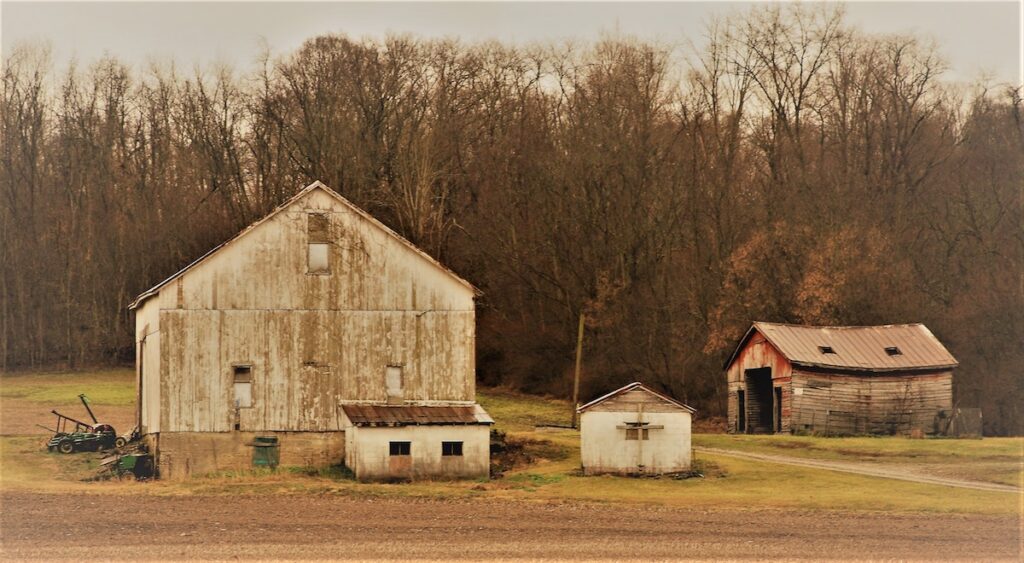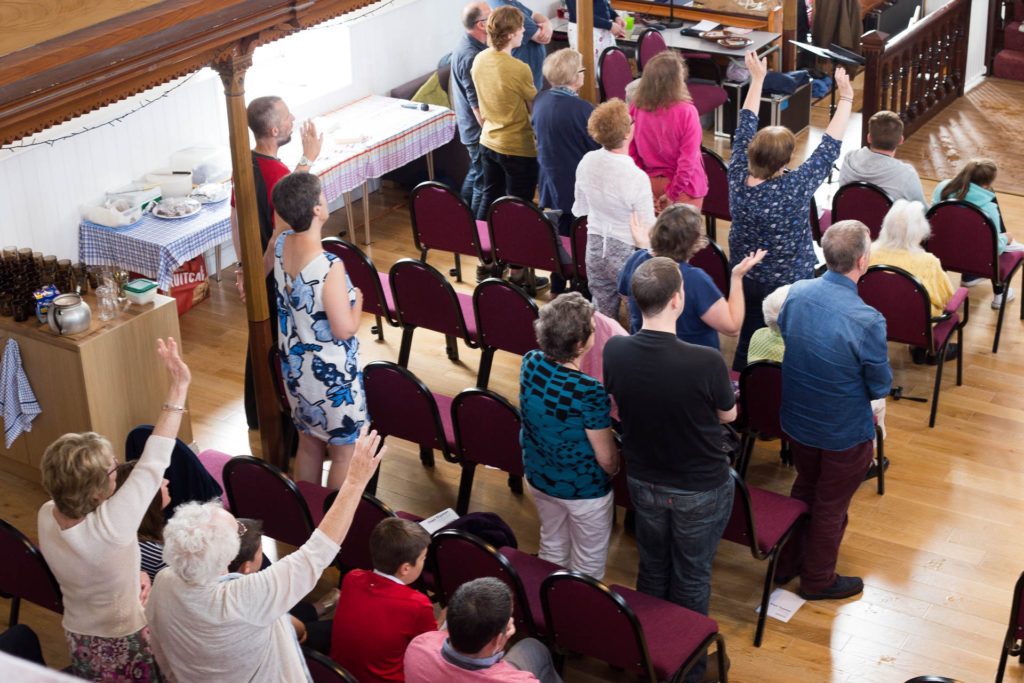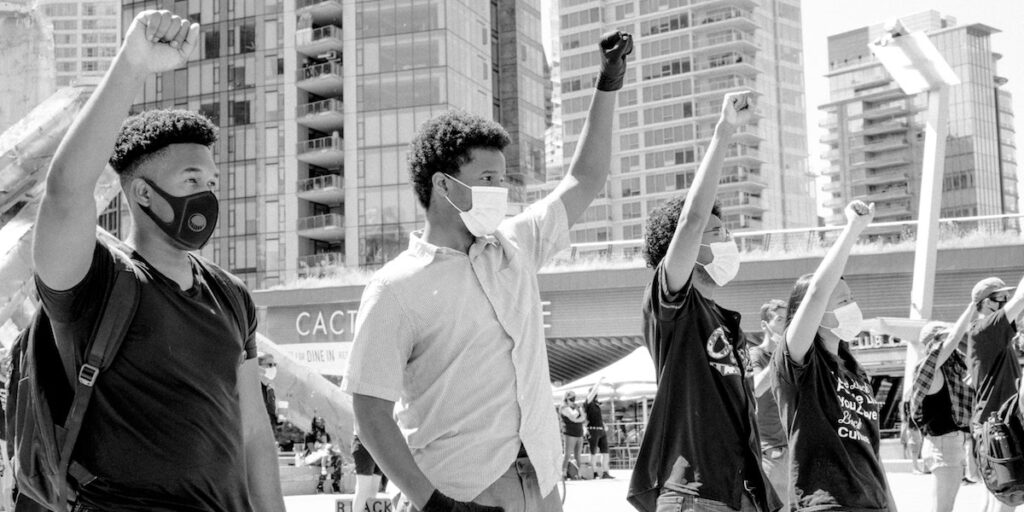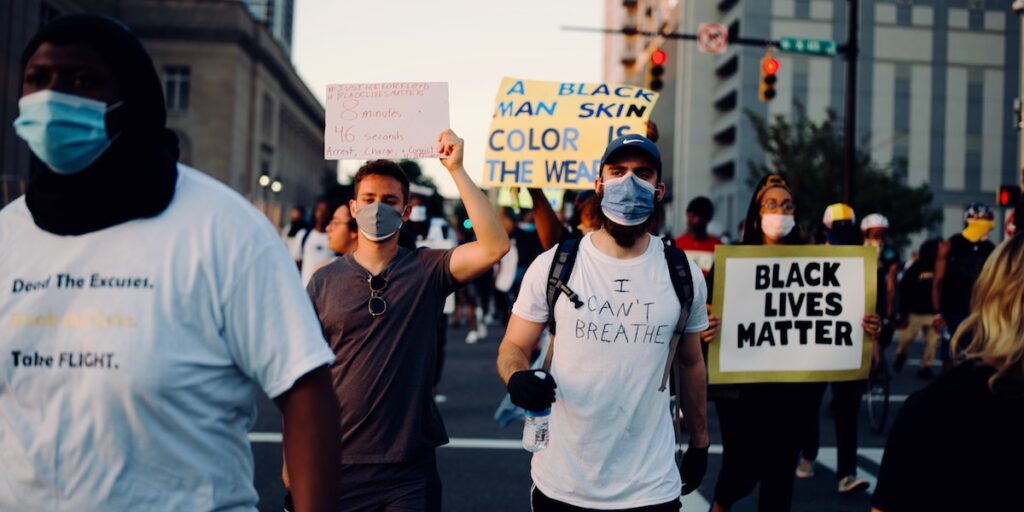Thanks to my father, I have, since childhood, held strong convictions for correcting injustice. Growing up on a tobacco farm in rural Virginia in the 1960s and 70s, my father was also raised with the understanding that all people, regardless of race or socioeconomic class, should be treated with respect. Much of this was counter to that of his fellow white peers, especially at the time of integration.
My great-grandparents, who were sharecroppers on the farm along with the African-American family next door, had a relationship with their neighbours that extended far beyond the work day into friendship. They were to my father, living with his grandparents and single mother, an extension of his own family. I was always fascinated by his recollection of conversations overheard in his grandparents’ home with their neighbours about racial inequality during the height of the civil rights movement. Even moreso, moved by the stories about the effects of racism on those around him. So when I was very young and we moved to what was at one time a dairy farm in rural East Texas, and became the only non-relatives in our African American neighbourhood, I believe that for my father, in a way it felt like home.

As a child I began to see that much of the racism of past decades still permeated my community through some of my peers, teachers, and even church leaders. Like my father had done more than thirty years before me, I wrestled with the inconsistencies of what I was being taught at home and what I was seeing in the world around me. Our community would hold an annual Martin Luther King Jr. Day march that my family would participate in, ending in a community-wide service with participation from some of the local churches. Over time I noticed that this seemed to be the only time the congregations in our community were not segregated. Over the years, my father and I had attended a number of events at the predominantly African American church that my neighbours attended. When I was a teenager, he decided it would be a good idea to approach our church about the potential of inviting their Gospel choir to come sing one Sunday, perhaps doing a service together. He brought this up a few times to the music minister at that time, who continued putting off an answer. At first we thought he was probably just busy, but over time as my father continued to ask, we realized that the answer was in the silence. There was no intention of an invitation.

Later in my freshman year of college I was attending a private Christian university that required all incoming students to take a class focusing on worldview. Waitlisted for my first choice, I was instead enrolled in a class focusing on racial reconciliation with Native Americans. The university was located on the state line of Arkansas and Oklahoma, which has a large population of Native Americans or (First Nations people). So although seemingly obscure, this subject was surprisingly relevant to our surroundings. I now understand that my knowledge of Native American history before this course was very shallow and honestly misunderstood. I was ignorant to the reality that their problematic relationship with colonization was not just a thing of the distant past, but one they still live with daily. During that semester, I also had the absolute privilege of attending a church service through the medium of the Cherokee language. Afterwards, they insisted that we stay for their weekly meal together. This service reminded me of something I had experienced earlier that year.

The previous summer I served on a short-term team with Linguæ Christi, where I attended my first Welsh language chapel service, hanging around afterwards to socialize over tea and biscuits. One of the most overwhelming motivators as I began learning Welsh was the excitement I was met with by my national friends and others in the Welsh-speaking community. I had so many people volunteer their time, energy, and knowledge to help me. People who I had just met would literally hug me simply because I was an American learning Welsh. As a people who for so long have known and understood the value of their culture, but have needed to justify and legitimize it to others, there was a solidarity—an allyship—to learning Welsh. I once asked a friend if he found it strange that I was so invested in his culture. He told me that though seemingly odd, it was exciting to see someone outside of his Welsh community not only take an interest, but make an investment in what he and those around him love so dearly. It was advocacy. They didn’t “need” me to advocate on their behalf, but I did because I wanted to, because I valued them, and more importantly, because I knew that God valued them. He sees them and he speaks to them through their heart language. So if I desperately wanted them to know how loved they were first and foremost by God, then also by myself, how could I do anything else?

As I proceeded to serve with Linguae Christi, I continued gaining a better understanding of minority language groups throughout Europe. As I began to learn about the long and complicated histories between these indigenous minority communities and their respective countries, I couldn’t help but think of the minority communities in my own home country. And as I began to study sociology in college, these thoughts became a near constant preoccupation. Over the past few years, I’ve reshaped the way I understand allyship. I will often hear the false narrative that minority groups are asking for special privilege. In reality, they are having to justify their own humanity. Not automatically given the benefit of the doubt like those in the majority, minorities are often asked to be the exception in order to be valued. It is important that people in the majority advocate for minorities, but not because they need us to step in and save them. Instead, it is crucial because we listen to and trust the voices of people who look and act like us. Even in moments of injustice or civil unrest towards other people groups, we are inclined to turn to others like ourselves, instead of those being directly affected.

I wonder why that is. Do we think it comes with more credibility? Is it because, if we’re honest with ourselves, we do not truly value the lives of others as much as we do our own, or even our loved ones? Is it because when we’re told to love our neighbours as ourselves, we maybe picture people who look like us? So when authorities and institutions oppress people who aren’t like us, do we feel for the marginalised, but not with them? Let’s be honest with ourselves, how many friends do we have that not only look, but act, think, or believe differently from us? How diverse is your circle of friends or influences and what does this say about the way we see the Church, and more so, the world? Our lack of outrage for the oppressed can often come from our short-sighted view of God’s design for community and for the Church. Because injustices aren’t just against some of humanity, but ultimately, against all of us. Each of us are created in the image of God and we are called to love one another to the point of sacrifice. Caring is not optional.

Many of us even benefit from injustice. We can unknowingly experience privilege in society where other groups of people are underrepresented and suffer because of it. Often it is not that we choose to be unjust or biased, but this injustice infiltrates our society without our consent. Long established laws and regulations aid us while proving to be a detriment to others. It is as if injustice is seeping into the water in which we swim. So it is significant that we swim against the current of something that benefits us and work towards something that benefits all. Everyone wants to feel seen, to feel known, and valued. And no one deserves it any more or less than anyone else. And the more you truly see people, the deeper you know them. The natural result is a desire to see in their lives and in their communities the same things you long for in your own. Like mercy, justice, grace, and love. When you begin to see mercy and justice denied for one group of people, it becomes difficult not to start noticing them in others you may be familiar with as well. Serving and living amongst Welsh speakers not only began to open my mind and convict my heart for the minority communities in the United States, it also gave me a way to begin a dialogue with those around me back home.

Often these types of conversations are tough because they quite literally hit too close to home. We can be easily offended when our cultural narrative is challenged by our neighbour’s alternate worldview. It can be frustrating and time-consuming to put in the work to educate ourselves, specifically to a reality that we may feel doesn’t directly affect us. There is often guilt in realizing that we could be doing more to champion others and that genuine love is not passive and must involve action.
I can spend the rest of my life dedicated to learning and growing in my understanding of God’s design and his plan for reconciliation and I still won’t have all of the answers. We never stop growing and learning. However, in coming back to the U.S. and sharing the way God delights in the diversity of minority languages throughout Europe, it has allowed me to explore with people the ways in which he is doing that in the U.S. and the opportunity we have of joining in that work. It is not easy work. It is not fast, and in fact, it is unending. But it is a calling, a mandate of the Gospel that we love our neighbours as ourselves, and it is a privilege to be even the smallest part of the work God is doing.
